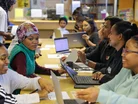WEF: Exploring Equity in Green and Digital Transitions

What does equity mean in the context of green and digital transitions? This question forms the foundation of the World Economic Forum’s (WEF) 2025 report, titled ‘Unlocking the Social Economy: Towards Equity in the Green and Digital Transitions’.
Jointly developed with Deloitte and the Schwab Foundation, this document highlights the essential role that the social economy plays in fostering equity amid these sweeping changes, while exploring how addressing disparities ensures more inclusive economic growth.
This strategy is closely tied with the objectives of the United Nations Sustainable Development Goals, especially in the areas concerning poverty reduction, decent work, reduced inequalities, and sustainable communities.
The WEF's report is a comprehensive guide that underscores the critical nature of the social economy in addressing economic equity during significant global shifts. As the planet engages in profound green and digital transformations, the opportunities are vast but come with a risk of widening existing inequalities if they remain unmanaged.
- WEF says: “Equality means that we treat everyone equally - each person or group of people is given the same resources and opportunities. Equity means that we provide resources and opportunities that fit the specific needs or circumstances of that person or group, and in that way, we can reach an equal outcome.”
Insights from the WEF Report
The green shift focuses on decarbonisation and enhancing environmental sustainability, with projections indicating a potential creation of up to US$10.1tn in business opportunities and 395 million new jobs by 2030. On the digital front, this sector already constituted over 15.5% of the global GDP in 2022.
However, the advantages of these transitions are not uniformly distributed: around 2.6 billion people still have no access to reliable internet services and 760 million live without electricity.
The report posits that social enterprises, of which there are approximately 10 million worldwide generating over US$2tn in annual turnover, are pivotal in fostering economic equity. These enterprises place a higher emphasis on social and environmental impacts rather than on profits alone.
These dual transitions are centred around people and their capacity to incite change, according to Daniel Nowack, Head of Social Innovation at the Schwab Foundation for Social Entrepreneurship and the WEF.
He comments: "Social innovation is a tool that allows everyone to be an actor in these massive transformations - not just a subject to them." Social entrepreneurs are at the forefront of creating resilient jobs, expanding access to essential services, and solidifying the basis of a fair and equitable economy.
Employment and Skill Development
Central to the social economy's contribution towards equity is its impact on employment and skill development. Social enterprises are set to train and employ 200 million people from typically marginalised groups, thereby tackling unemployment and closing skills gaps.
This focus on inclusive employment and training facilitates economic growth that benefits a broader spectrum of society, helping to lessen the divide between those with access to opportunities within the green and digital economies and those without.
Affordable and Accessible Goods and Services
Additionally, the WEF report highlights how social enterprises are enhancing the affordability and accessibility of essential products and services.
Through innovative technology use, tiered pricing strategies, and promoting circular economy practices, these organisations ensure that the fruits of green and digital transitions reach a larger audience. This strategy is vital for reducing inequality and elevating life quality for marginalised communities.
Financial Inclusion
Another major impact area is financial inclusion. The report notes that social enterprises are unlocking nearly US$1.6tn in finance and investment to marginalised groups via impact investing, microfinance, and fintech.
This democratisation of finance fosters sustainable development from the ground up, enabling more comprehensive participation in these transitions by individual communities.
Suggested policy measures to enhance the social economy include crafted action plans, tax benefits, subsidies for crucial products, and embedding social criteria in procurement and investments.
These policies are critical for shaping a sustainable future and ensuring equitable distribution of the benefits derived from green and digital transitions.
Explore the latest edition of FinTech Magazine and be part of the conversation at our global conference series, FinTech LIVE.
Discover all our upcoming events and secure your tickets today.
FinTech Magazine is a BizClik brand


